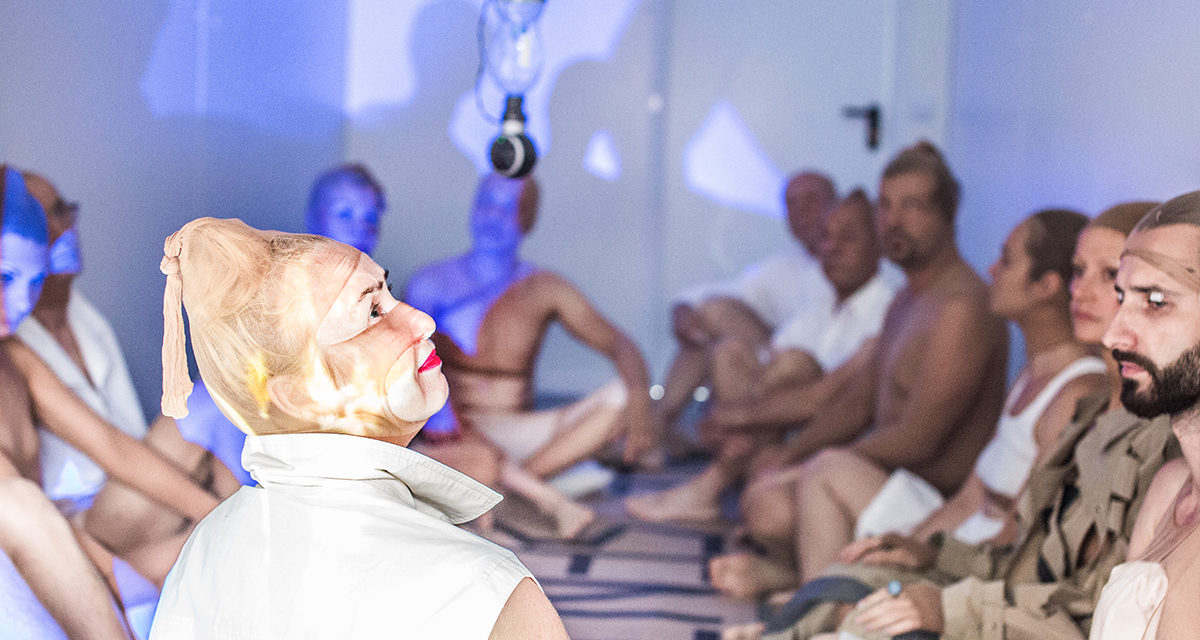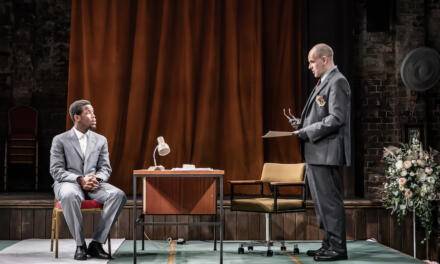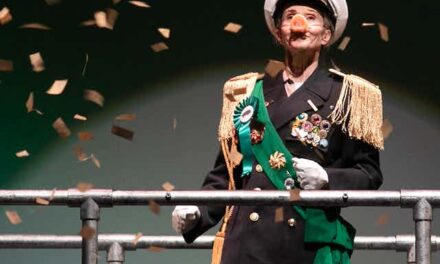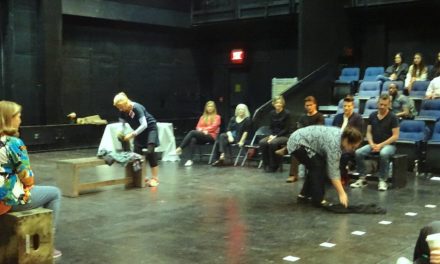Protests against the new manager
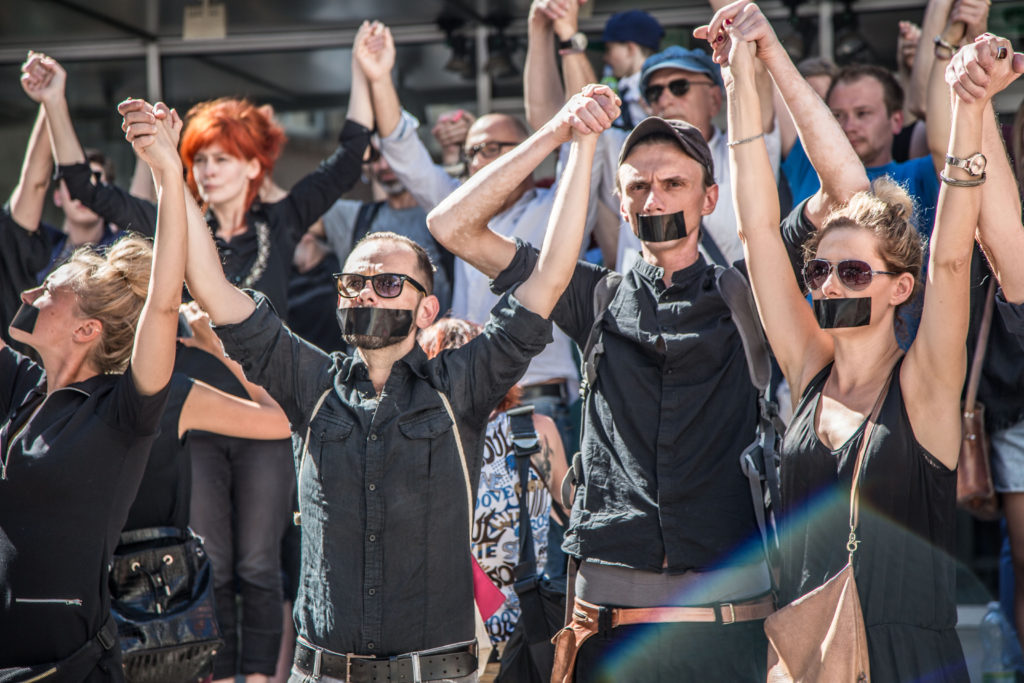
Protests after nominating a new manager of Polski Theatre in Wrocław, photo by Natalia Kabanow, Archive of Polski Theatre in the Underground.
During the decade 2006–2016 the Polski Theatre in Wrocław became one of the leading Polish theatres. Thanks to cooperation with important theatre directors, such as Krystian Lupa, Ewelina Marciniak, Monika Pęcikiewicz, Monika Strzępka, Barbara Wysocka, Michał Borczuch, Krzysztof Garbaczewski, Jan Klata, Paweł Świątek, Łukasz Twarkowski, and Michał Zadara, most of the theatre’s artistic team was undergoing the process of maturing into professional emancipation and increased employee awareness. The first visible sign was the establishment of the trade union Workers’ Initiative, which most of the actors and others engaged in the artistic work joined. At the same time, the Foundation “Polski Theatre–TP for Art” was created independently of the theatre. In August 2016, Cezary Morawski was appointed as the new manager of Polski Theatre in Wrocław to the accompaniment of the protests from some members of the appointment panel (for example Krystian Lupa) and the majority of the ensemble. On the first day of his work, September 1, the fan page “Teatr Polski–w podziemiu/Polski Theatre in the Underground” was launched. It was a gesture that channeled the energy of discord into the destruction of the theatre, into a directorate based on lies, procrastination and the arrogance of authorities.
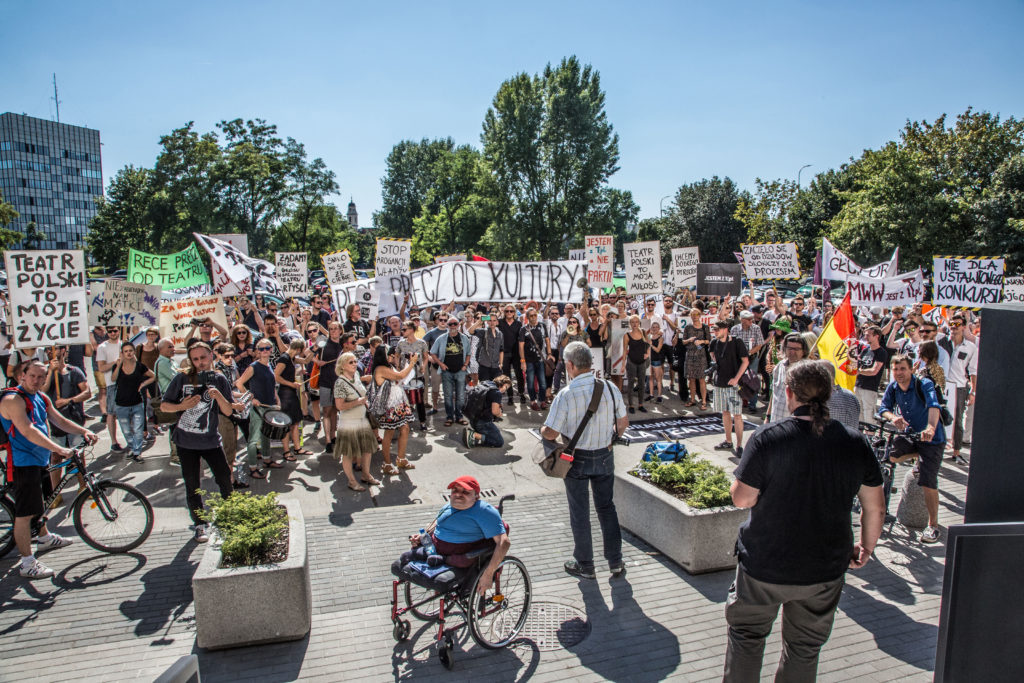
Protests after nominating a new manager of Polski Theatre in Wrocław, photo by Natalia Kabanow, Archive of Polski Theatre in the Underground.
Polski Theatre in the Underground as communitas
What is important is that in the Polski Theatre in the Underground there is no rigid structure and no hierarchy of power. This community or collective combined, as defined by sociology, a common ideological-aesthetic frame, acts as communitas, as described by Victor Turner. Everyone deals with what the Underground needs: meetings with representatives of authorities and directors of institutions, buying necessary equipment for performances, preparing parts of the set design, cleaning, etc. This model of action is not, of course, something that should be immediately implemented in public theatres. However, experience, already over a year old, can be used to improve the model of management for public theatres in Poland that is based on a charismatic leader. This modernist, scarcely democratic, obstructive participation should fall into oblivion. The value is to create a social ecosystem including the theatre team, the audience, and the local community. The goal cannot be the director’s ego satisfied with public money or commerce.
The idea of the artistic activity of the Polski Theatre in the Underground is Garbaczewski’s. He also directed the first performance based on the lost play by Stanisław Ignacy Witkiewicz, So-Called Humanity In Madness [Tak Zwanej Ludzkości W Obłędzie] (January 6, 2017); followed by Vladimir Majakovsky’s The Bedbug [Pluskwa], prepared by Borczuch (February 6, 2017); William Shakespeare’s Macbeth, by Świątek (March 6, 2017); Constant Shapes [Kształty Stałe], by Twarkowski (April 13, 2017);. Dreamers/Towards A Better [Marzyciele/Ku Lepszemu], by Sebastian Majewski (July 3, 2017); Silent Theatre: Polish Globus [Globus Polski], by Oskar Sadowski (August 9–10, 2017); and Silent Theatre: Lady Macbeth, by Garbaczewski (August 11–12, 2017). All performances were prepared in different public spaces in Wrocław, such as the foyer of the Music Theatre Capitol, Mieszczański Brewery, Centennial Hall, Wolności square, a shipping container located at the parking area in the center of the city. These performances were prepared with almost the entire previous Ensemble of the Polski Theatre in Wrocław. So our group–Polski Theatre in the Underground–is composed of more than 25 actresses, actors, producers, graphic designers, and photographers. Those who were free took part in our performances.
![Plato's "The Republic" [“Państwo”], dir. by Krzysztof Garbaczewski, photo by Natalia Kabanow, Archive of Polski Theatre in the Underground.](https://thetheatretimes.com/wp-content/uploads/2018/03/Platos-The-Republic-1024x683.jpg)
Plato’s The Republic [“Państwo”], dir. by Krzysztof Garbaczewski, photo by Natalia Kabanow, Archive of Polski Theatre in the Underground.
Garbaczewski’s Silent Theatre
It is worth stopping for a while on the Silent Theatre project invented by Garbaczewski. For the first time in Poland, and probably in Europe, a theatre performance was realized using the virtual reality 360-degree technique and was intended for viewing on smartphones. Both performances took place in a container; the gathered audience could watch the theatrical activities through a crack in the window. The right tool for receiving it was, however, a smartphone, on whose screen the container’s interior grew to infinite sizes, and each viewer could watch a different performance, changing their viewpoint. This is the first such radical gesture in the theatre that gives the spectator the status of an artist.
![Plato's <em>The Republic</em> [<em>Państwo</em>], dir. by Krzysztof Garbaczewski, photo by Natalia Kabanow, Archive of Polski Theatre in the Underground.](https://thetheatretimes.com/wp-content/uploads/2018/03/01-panstwo_fot-NK-32-1024x683.jpg)
Plato’s The Republic [Państwo], dir. by Krzysztof Garbaczewski, photo by Natalia Kabanow, Archive of Polski Theatre in the Underground.
The Polski Theatre in the Underground in the contemporary Polish context
The Polski Theatre in the Underground received two important awards in 2017: one honor is given by a local newspaper, for “a consistent battle in defense of freedom of art and value, which is public theatre, and fresh, full of energy, artistically fulfilled performances,” and the Puzyna’s Stone, given by the nationwide monthly Dialog, for “theatre activity combining art and life, creative originality with commitment to public affairs”.
Artistic public theatres, that is, those financed by the Ministry of Culture, or by local governments from taxes on all Polish citizens, have an important duty to those citizens: they must prepare productions at the highest artistic level, those that will initiate a serious, often painful dialogue with the audience; and they must also take care of the theatres as institutions, that is, allow debuts for young directors and hire young actors. In addition, most public theatres have educational tasks in their statutes. Public funds transferred to theatres can be treated as additional payments for tickets guaranteed to every citizen under the right to use cultural goods in Article 73 of the Constitution of the Republic of Poland: “Everyone is guaranteed the freedom of artistic creation, scientific research and the announcement of their results, freedom of teaching, and freedom to use cultural goods.” Considering the basic aims of public theatres in Poland, it is impossible not to recall Adam Mickiewicz and his Lecture XVI. Using today’s language, the poet proposed a performative concept of the theatre. The change which the spectator would experience was something expected by the poet and something unique for the art as the domain of the spirit: “The purpose of this art [theatre] is to stimulate, or rather if it is allowed to express, enslave the action of slow spirits.” This is our choice. This is our imperative!
This post was written by the author in their personal capacity.The opinions expressed in this article are the author’s own and do not reflect the view of The Theatre Times, their staff or collaborators.
This post was written by Piotr Rudzki (University of Wrocław).
The views expressed here belong to the author and do not necessarily reflect our views and opinions.

